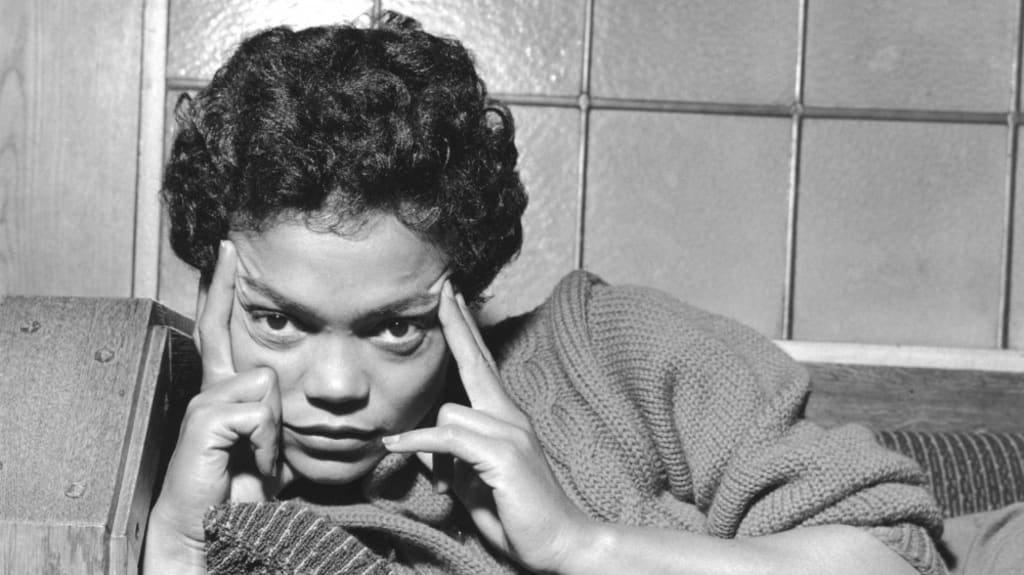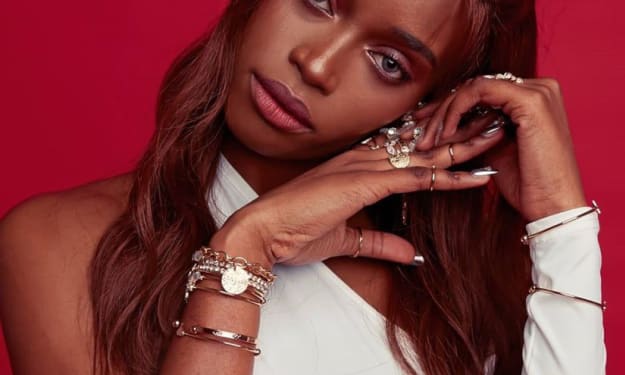
Like many people, I got introduced to Eartha Kitt a few years back, when a video clip of her was making rounds on Instagram.
“A man comes into my life and I have to compromise? You must think about that one again.”
Accompanied by a burst of wickedly legendary laughter.
I remember watching that video and laughing my ass off from how theatrical and dramatic her response was. But I found her opinion on it so inspiring that I did some research and became instantly obsessed with this incredibly talented “rebel” who spoke on so many pressing issues and sang in so many different languages.
Women like Eartha kitt with a very different approach and perspective on music aren’t usually appreciated, but despite all the issues she faced, Eartha Kitt has no doubt left her mark on the world, and me as an aspiring female black artist.
Her music touch on topics such as ageism, love and the power of feminity. But what really gravitates me towards Eartha is the badassery of representing emotions we regard as dark but are intrinsic qualities of us as humans.
Anger, jealousy, rejection and oppression.
These are emotions many of us feel every single day but find it hard to express, as society regards these emotions as unacceptable. But Eartha Kitt has taught me how to represent these emotions in my art, so beautifully, shying away from using metaphors in a way that downplays the emotions but in ways that amplify it. Words like “evil” “witch” “mad” are a few of the type of words that many of Eartha’s songs contain.
Back then, the notion of black women being so aggressive was something that was perpetuated more often, black women with unpopular opinions were vilified by the press and attempts were made to silence them. Eartha Kitt suffered this herself when she made an anti-war statement during a White House luncheon, where she was invited to speak about issues affecting the youth.
"You send the best of this country off to be shot and maimed. No wonder the kids rebel and take pot."
This is a very insightful take on the popularity of war during that time.
For giving this innocent speech, Eartha was branded a sadistic nymphomaniac, the press ran with her speech and painted her as an angry black woman who made the First Lady cry. She was blacklisted, her shows and bookings cancelled without valid reasons and details of her sex life was released to the media.
It was reported that on this day after her speech, she stood outside alone in the cold for hours as all the taxis she hailed ignored her.
She suffered a huge setback in her career, all because she stood up to the government and spoke about issues like race and war. Despite all of this and being under constant surveillance by the CIA, Eartha was not fazed but continued her activism on so many important issues such as same-sex marriage, underprivileged youths, poverty and racism.
LGBTQ+
As a heterosexual, Eartha’s support for the LGBTQ+ community is incredibly inspiring as it shows that whilst you might not be part of an oppressed community, you can still fight for the cause and speak out about it. Your silence is complicit, and your voice is very important. Speaking up on issues like this means we are collectively one step closer to our goal of freedom.
“We're all rejected people, we know what it is to be refused, we know what it is to be oppressed, depressed, and then, accused, and I am very much cognizant of that feeling. Nothing in the world is more painful than rejection. I am a rejected, oppressed person, and so I understand them, as best as I can, even though I am a heterosexual.”
Racism
Eartha being born to a white father and a black mother, conceived of rape on a cotton plantation in South Carolina, has so many times spoken on race issues. She spoke on issues such as being too white for black people and too black for white people, an issue many people of mixed heritage can relate to. Touring South Africa during one of the most dangerous times in the country to be black, a time when the country was enforcing apartheid, Eartha’s tour was directed towards integrating audiences and building schools for black children. Eartha was also a member of the Women's International League for Peace and Freedom, her criticism of the Vietnam War and its connection to poverty and racial unrest in 1968 is an essential part of peace activism.
“Things will get better. They've got to.”
Poverty and underprivileged youths
In 1966, Eartha established a non-profit organisation for youths called the kittsville youth foundation, in one of her many efforts to create alternative ways for youths to express themselves, establishing recreational areas to keep the youth out of trouble. Whilst many criticise troubled youths today and ignore the root cause of their unemployment and delinquency, Eartha was able to understand the issues that led to many youths ending up in jail and worked tirelessly to give youths a voice.
“…I have lived in the gutters. I know the youth of America today are not rebelling and are not hippies for no reason at all. We don’t have what we have on Sunset Boulevard for no reason.”
Women Rights
Through her music, Eartha has spoken about issues women have faced for centuries in society. Even though there are many of them, here are three of my favourites which I regard as the biggest hits of all time, as they start conversations society has ignored for a very long time.
I want to be evil
I want to wake up in the morning
With that dark brown taste
I wanna see some dissipation in my face
I wanna be evil, I wanna be mad
But more than that, I wanna be bad
What I absolutely love about this song is the middle finger it gives to the idea that a woman has to be feminine, sweet and reactive to be worthy. When a woman dares to be the opposite of these things, opinionated, passionate or angry, they are regarded as masculine and aggressive.
This is perpetuated in seemingly harmless phrases like “why don’t you smile” which further amplifies the notion that a woman has to be sweet at all times. Eartha captures this problem perfectly with this song, touching on the idea of “purity” and being “chaste” as an invalid measure of a woman’s worth. Today, this topic is still as important as ever, as society still vilifies women who are open about their sexuality. Whilst Eartha’s voice is sonorous and beautiful, the melodies of the song are not enough to distract you from the strong message in the lyrics.
A woman has no definition, there are no rules when it comes to being a woman, and a woman can be whoever she wants to be.
Snuff out the light
When a woman acquires a certain age
And the men who adored you no longer swoon
It pays to avoid the sunlit days
And live by the light of the kindly moon
Eartha is a pro at incorporating pressing issues into her music, and snuff out the light is no exception. In fact, this song is one whose message has haunted me for a long time. As a 23-year-old woman, who can be regarded as relatively young, society’s treatment of older women has affected me so much that I worry about even the tiniest of wrinkles on my face.
I’m constantly thinking about my “biological clock” and why I should get married now before I become too old for love. Having these issues at this age makes me wonder how those who are older than me can cope in a society that sees older men as sexy and shuns older women. Eartha uses this song to highlight this pressing ageism and sexism issue, speaking about youth and how badly she wants to keep her looks, as in this society, the older a woman gets the more her beauty fades.
When I listen to this song, the questions that fill my mind are: What really is beauty? Who defined beauty? What are the measures of beauty?
I’d rather be burned as a witch
They say that I’m a witch
And that I weave a spell.
Well…
I use my eyes to invite you,
My lips to delight you
And all the charms of the feminine wiles to excite you
They say that I’m a witch,
and that I weave a spell
This is another one of my favourites as it once again has a powerful message on how women are treated in our society. When a woman achieves a certain level of success, it is automatically assumed that she’s used her looks or body to get to the top, that somehow she has more of an advantage because she is a woman.
This is ironic, as the majority of the people in positions of power are actually men. But by doing this, society minimises their achievements, and the accolades they deserve are given to invisible men who must have made their success a reality. A beautiful woman, becomes a witch in this sense.
On the other hand, this song can also be interpreted as an ode to the power in the feminity of a woman, and how certain parts of women are sexualised. The beauty in this song is that you as an audience might listen or read the lyrics and interpret it as something personal to you, something that speaks to you as a woman.
How Eartha has influenced my life as an aspiring musician
Eartha Kitt died of colon cancer on the 25th of December, 2008 at the age of 81, but her activism, her energy and voice is one that will never die. She has inspired me and many other artists that the beauty in having a platform is the ability to speak up about issues that affect humanity as a whole.
As a black woman, I relate to her in so many ways. I do not see my anger as something to be afraid of as it’s a valid emotion, a result of the many ways in which I’m oppressed.
As a woman, Eartha kitt has taught me that my worth as a woman should not be affected by my looks or my demeanour, neither should it be affected by my age.
As a human, Eartha Kitt has inspired me to be resilient, speak unapologetically and to empathise with oppressed groups I may not be a part of.
As a musician, I am so fascinated by her style of music that I have adopted her genre in some of my songs. Whilst this genre has been modernised, I think it’s important to keep it alive in its original form, so that names like Eartha Kitt stay in our hearts forever.
So here are snippets of two unreleased songs of mine, in the spirit of Eartha Kitt.
About the Creator
Damilola
poet, wanderer, writer.






Comments
There are no comments for this story
Be the first to respond and start the conversation.